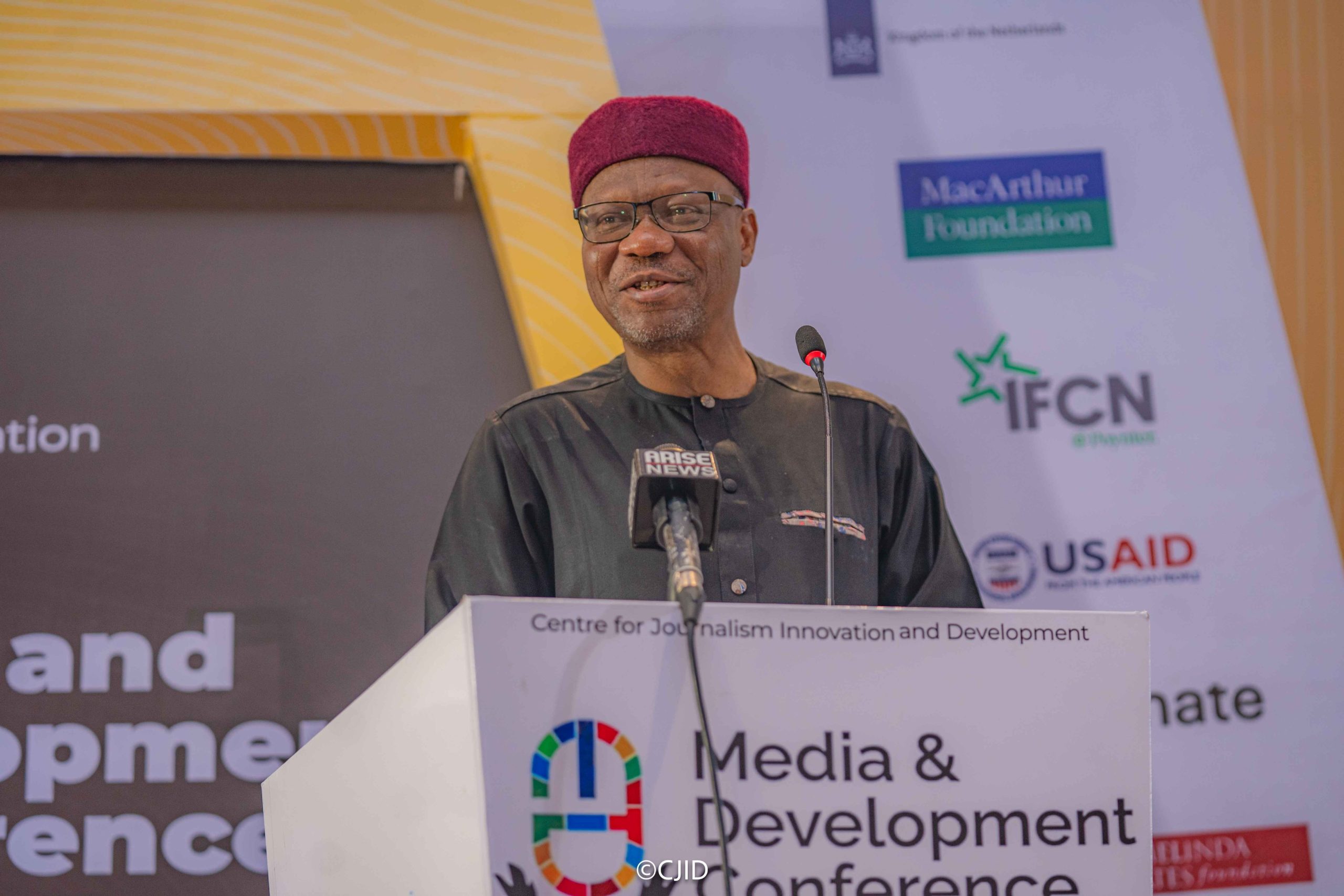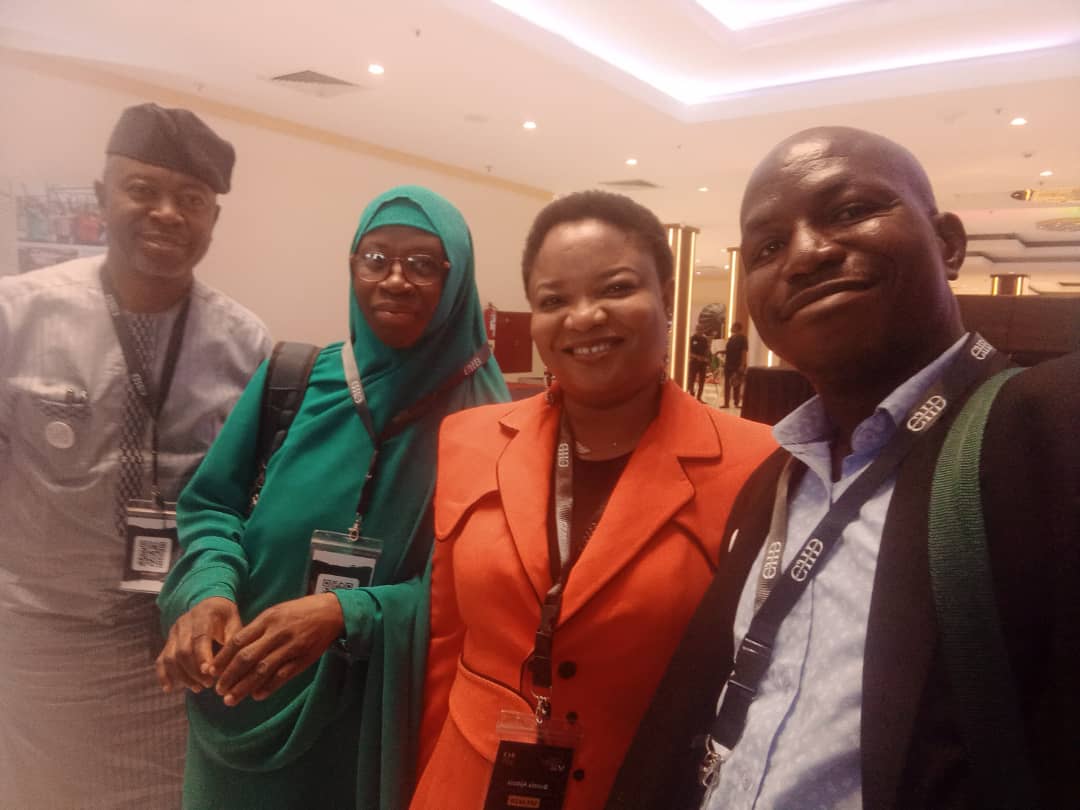By Jamiu Folarin
Stakeholders at the 2024 Media Development Conference held in Abuja did not mince words as they undertake critical assessment of the media landscape in Africa in order to reposition it in the face of existential threats to its development.
The Conference organised by the Centre for Journalism Innovation and Development (CJID) started on high note where stakeholders dissected the challenges and laid the foundation to the solutions that are expected to harness the potentials of media and technology for inclusive and sustainable development in Africa.
A board member of CJID, Professor Audrey Gadzekpo, in her welcome address highlighted the efforts of the organisation in promoting accountability journalism and media development through series of activities projects, progranmes and activities.
Prof. Gadzekpo said the conference offered opportunity to reflect on the decade intervention of CJID and how stakeholders explore the potentials of media and technology for inclusive and sustainable development in Africa.
In their sperate goodwill messages, the President, Association of Communication Scholars and Media Professionals of Nigeria (ACSPN), Prof. Rotimi Olatunji; Africa Director, MacArthur Foundation, Dr. Kole Shettima; and Vice President, Africa, Luminate, Toyin Akinniyi, called for holistic and deliberate approaches through innovation, collaboration and effective adoption of technology to positively change the narratives in the media landscape in Africa.

While presenting the findings of his research titled: “Hidden Battles: Patterns and Nuances of Violence against Female Journalists in Nigeria” Charles Asiegbu, noted that women journalists are vulnerable as they are increasingly unsafe to discharge their duties.
Asiegbu identified the findings of the research to include prevalence and forms of violence against female journalists, barriers to accessing support and justice, and impact of violence on professional and personal lives.
He recommended establishment of safer work environment, implementation of relevant policies, safety strategies and enhanced digital security for female journalists.
Cyber Crime Law and Safety of Journalists: For or Against Journalists?
This was the questions many journalists and press freedom advocates asked the Director of the Nigeria Police Force National Cybercrime Center (NPF-NCCC), CP Uche Ifeanyi Henry, during isolated interaction with the Deputy Director of Journalism Programme of CJID, Busola Ajibola.
Several participants at the conference expressed concerns over the weaponisation of the Cyber Crime Law in Nigeria to track, detain and prosecute journalists who are exercising their constitutional responsibility of making the government accountable.
In his response, CP Henry who is also the Chairman of INTERPOL Africa Working Group on Cybercrime insisted that security agencies do not deliberately harass journalists with the Cyber crime law as a tool, promising to constantly engage the media to reverse the toxic relationship between the media and police to a symbiotic one.
“The outcome is what matters. It’s not possible for a police to work without the media.” CP Henry submitted.
Earlier, the first panel session titled: “Addressing the State of Attack on Media and Civic Space in Nigeria” interrogated the effective adoption of self versus external regulations in entrenching media freedom.
“There is a thin line between media responsibility, self-regulation and press freedom….I’m ashamed to say we are not doing well on self-regulation. Journalists commit murder and go away with it…we haven’t done much but there is hope in travelling in the right direction”, the Nigerian President of International Press Institute (IPI), Musikilu Mojeed noted during the plenary session.
“We should be clear about the role of journalists and the media, and what they should be doing and not be doing”
Mojeed who is the Editor-in-Chief, Premium Times, insisted that invasion of media houses, intimidation, harassment and persecution of journalists should not be rationalized under any guise.
Other panelists include the representative of Executive Director of the National Human Rights Commission (NHRC), Anthony Okechukwu Ojukwu, Project Lead, Joint Civic Defense Fun, Tsema Ede-Okoye, and Executive Director, Global Rights, Abiodun Baiyewu.
“If you don’t question how your money is used, then the provision of socio-economic activities will not work.” NHWC
They took a critical conversation on media freedom and civic space in Nigeria advocating against Strategic Lawsuits Against Public Participation (SLAPP), promoting collaboration among media stakeholders, naming and shaming violators of press freedom, and promoting ethical journalism.
“I think we should be mad that people are coming out to protest about the state of the economy and they’re getting arrested.”, Tsema Ede-Okoye.
This was followed by presentation by Programme Officer of the TrustLaw Thomson Reuters Foundation, Jane Nzomo, titled: “Empowering Independent Media: Legal Support Services for Journalists and Newsroom.”
Nzome identified some of its intervention as including grant for legal fees, provision of training and resources for journalists to strengthen their legal understanding and mitigate risk, and pro bono legal support for individual cases.

The Media Development Conference also provided platform for media freedom advocates, academics, civil society organisations who roll out interventions, projects and strategies adopted to enhance journalists’ safety amid increasing threats to civic space.
The session was moderated by the Project Manager, Media Freedom, CJID, Christiana Longe, with panel members including the Executive Director, Citizens’ Gavel, Nelson Olanipekun; the Regional Programs Manager, West Africa & Central Africa, Internews, Musa Sangarie; Professor of Journalism, Department of Communication Studies, University of Northern Iowa, Prof. Chris Ogbondah; and the Deputy Editor, The Eagle Online Juliana Ebere Francis.
More Land for Food or Housing?
“Housing Estates springing up across the country is a threat to agriculture and food security.” – Akeem Ibilade, Federal Ministry of Agriculture and Food Security.
“The statistic you provided is wrong as there lot of arable land in the rural area, all that is needed is to incentivize farming…the Nigerian president should declare State of emergency of food” – Kabir Ibrahim, All Farmers Association of Nigeria.
While the representative of the Federal Ministry of Agriculture expressed worry at the conference over the trend of conversation of arable land suitable for agriculture to housing projects and estates scattered across the country, the national president of All Farmers Association of Nigeria insisted that arable land is still in abundance especially at the rural areas.
“There is a lot of land, lots of possibilities, lots of manpower, all we need is incentivization.” – Kabir Ibrahim of AFAN.
Esther Maupe Ogun-Yusuf of Channels Television build on her recent venture into mechanized farming to moderate the panel session which focused Innovative Solutions to Food Insecurity in Nigeria.
The panelists include representatives of the Director, Animal Husbandry Department of the Federal Ministry of Agriculture, Winnie Solarin; the National President of All Farmers Association of Nigeria, Kabir Ibrahim; the Managing Partner, Sahel Consulting, Temitope Adegoroye; and the programme coordinator of Small Scale Women Farmers Organisation, Ogechi Okebugwu.
“Women in rural area don’t have access to network, information. They don’t have timely information.” Ogechi Okebugwu.
They suggested interventions required by stakeholders to reverse the food insecurity as including provision of funding, training, community support, and with government at the sub-national level being deliberate in reversing the food insecurity in Nigeria.
Climate Debt Swap in place of $300 billion Climate Funding for Poor Nations
Stakeholders also expressed concerns that the proposed $300 billion climate supports fund for poor nations will further worsen the debt profile of the countries.
The Chief Executive Officer of TAO Energy, Dr. Tobi Oluwatola, who raised this concern during the conference questions why poor nations take more debt in the name of climate finance.
“We need to adopt intervention that gives the quickest kind of change…Africa need to take leadership, find local ways to create value and explore the oil and gas as done by the United Arab Emirates and Qatar… to ensure climate change adaptability,” said Dr Oluwatola.
He added, “Sometimes there is the challenge of maintenance because the citizens don’t have buying power. So, it is important to stimulate demand.” Tobi Oluwatola.
The Project Manager of Centre for Investigative Journalism, London, Adeolu Adekola had opened the panel session tiled “Mobilising Climate Finance for Loss and Damage: Africa’s Pathway to Resilience and Equity in the Global Climate Agenda.”
Other on the panel who proffered solutions to the challenge include representative of the Federal Ministry of Environment, Dr. Abiola Awe; the Director General, Nigeria Hydrological Services Agency, Umar Ibrahim Mohammed; Mariama Ndow Jarju from The Gambia; and the Director for Corporate Affairs, Environmental Protection Agency, Ghana, Mrs. Audrey Quarcoo.
“We’ve learned our lessons in the way we access funds. Climate change is felt more at the local level.” – Mariama Ndow Jarju.
“Most of the time when we have issues of flood, we don’t have real time data to say the amount of land that has been submerged.”- Representative of Federal Ministry of Environment, Nigeria.
“Women in rural areas don’t have access to network, information. They don’t have timely information.”
This was followed by a session on “Just Energy Transition: Enhancing Transparency and Accountability in the African Green Mineral Mining Sector” which was moderated the Partner, Mining Sector of the PwD, Habeeb Jaiyeola.
Jaiyeola was joined by the Executive Secretary of NEITI, Dr. Orji Ogbonnaya (NEITI); the CEO/MD, Rural Electrification Agency, Abba Abubakar; CEO, PIN Africa, DRC, Benedicte Kalombo; the Manager, Mídia Lab, Mozambique, Marcelino Maningue; and the Special Assistant on Community Engagement to the Minister of Solid Mineral Development, Emily Offodile.
“Delayed procurement processes hinder progress, and deny communities the opportunities to thrive.” – Benedict Kalombo.
“If a community needs to receive $10 million in one year, they cannot use that amount of money in 3 months.” – Macelino Maningue.

This was followed by a technical session on JET Minerals and Data Innovation Showcase featuring insights from Ifeanyi Chukwudi (CJID), Benedicte Kalombo (PIN Africa, DRC), Marcelino Maningue (Mídia Lab, Mozambique), and Femi Amele (Dataphyte), showcasing partner initiatives, investigations, and innovative portals.
The conference also witnessed conversation on amplifying women’s economic empowerment, moderated by Osasuyi Dirisu (PIC). Panelists include Hansatu Adegbite (UN Women Nigeria), Olajide Abiola (KiaKia Finance), Sussan K. Ihuoma (Inclusive Friends Association), Chisom Nwankwo (The Skilled Woman Initiative), and Adaora Onyechere Sydney-Jack (GSAI).
The last panel session on “Safeguarding Information Integrity during Elections in Africa” was moderated by the Africa Editor, Center for Collaborative Investigative Journalism, Ajibola Amzat.
Other panelist include Hamadou Tidiane Sy (E-jicom), Samuel Folorunsho (YIAGA Africa), Rachelle Faust (NDI), Dr. Imurana Mohammed (National Commission for Civic Education, Ghana), and Barrister Festus Okoye (Former INEC Commissioner).
They called for multi-stakeholders approach in flattening the curve of disinformation during the electoral process in Africa.
“We’re now slowly starting to conduct elections just for conducting election sake.” – Samuel Folorunsho.
“The institutions that should ensure that the legal amendments work, sometimes there are gaps in the way they carry out their work.” – Dr Imurana Mohammed.
“Because those on social media break news so fast, the mainstream media now rush to break news without verifying things first. “ – Festus Okoye.
In her closing remark, a board member of CJID, Professor Audrey Gadzekpo, commended participants for their insightful contributions and urged them to use the opportunity of the conference to collaborate for development of the media in Africa.
871 total views, 2 views today





